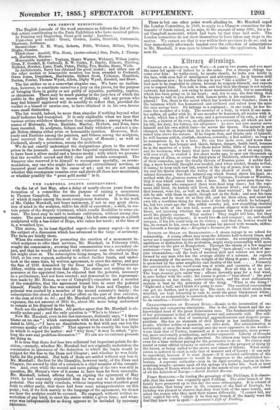THE CAMPBELL STATUE CONTROVERSY.
On the 1st of last May, after a delay of nearly eleven years from the formation of a committee for the purpose of raising a monument to Thomas Campbell, the monument was erected in Poets-Corner, of which it ranks among the most conspicuous features. It is the work of Mr. Calder Marshall, and bears testimony, if not to any great eleva- tion of mind in the sculptor, still to his skill of execution ; a skill, in cer- tain points of the drapery treatment, which recalls Roubiliao to some ex- tent. The head may be said to indicate cultivation, without strong cha- racter. The poet is represented standing ; his left arm resting on a plinth sculptured with a bas-relief of Hope, who raises her torch ; at the base of it, a wreathed lyre. This statue, in its least dignified aspect—the money aspect—is now the subject of a discussion which has advanced to the verge of acrimony. The facts are briefly these. When the committee for promoting the erection of a monument in-
vited sculptors to offer their services, Mr. Marshall, in February 1845, sought the commission • avowing that remuneration was a secondary ob- ject, and that he would be content with whatever sum the subscription- list might close at. The subscription being meagre, he obtained in May 1849, at his own request, authority to collect further funds, and under- took at the same time, by written agreement, to erect the statue, and pay the fine of 2101. demanded by the Dean and Chapter of Westminster Abbey, within one year from that date. The statue not making its ap- pearance at the appointed time, he objected that the pedestal, necessary as a preliminary, had not been erected; and demurred to the representa- tion made by Mr. Moxon, as one of Campbell's executors and a member of the committee, that the agreement bound him to erect the pedestal himself. Finally the fine was remitted by the Dean and Chapter; the pedestal was erected by a member of the second executor's family ; the subscription-list closed after a further effort on the part of that executor, at the sum of 4441. 48. 6c/. ; and Mr. Marshall received, after deduction of expenses, the net amount of 2911. 68., about 301. more being understood to remain at his disposal in the bank.
Such are the admitted facts. All parties agree that Mr. Marshall is ab- surclly under-paid ; and the only question is "Who's to blame?" Now Mr. Marshall, even in his last statement, distinctly says, "I throw blame on no one " ; which corresponds with what he had said in a letter dated in 1851,—" I have no dissatisfaction to find with any one but the extreme apathy of the public." That appears to be exactly the true light in which to regard the matter : and "why then," it may be asked, "pro- long the sore and profitless discussion ?" W can see no rational grounds for doing so.
It is true that there had been two collateral but important points for de- cision,—namely, whether Mr. Marshall had not originally undertaken the commission in ignorance of the deduction to which the funds would be subject for the fine to the Dean and Chapter ; and whether he was fairly liable for the pedestal. But both of these are settled without any loss to Mr. Marshall; the first by the liberality, however tardy, of the Dean and Chapter, the second by that of a relation to a chief member of the commit- tee. And, even while the second and more galling of the two was still in question, Mr. Moxon's view of it seems to have been far from untenable. Mr. Marshall, indeed, affirms that, on signing the agreement of May 1849, he had expressly stipulated that he was not to be liable for the pedestal. One may fairly conclude, without imputing want of perfect good faith to either party, that there had been some misapprehension on this point ; but, if we look merely to the language of the agreement, we do not see how the sculptor could be excused. He engaged, without written re- servation of any kind, to erect the statue within a given time; and what- ever was indispensable for so doing appears to be included by mneasary i nee. There is but one other point worth alluding to. Mr. Marshall urged the London Committee, in 1849, to apply to a Glasgow committee for the transfer of funds raised, as he says, to the amount of some 5002., for a lo- cal Campbell memorial, which had been by that time laid aside. The London committee do not show themselves to have taken any steps in the matter. We cannot see that it was within their province to do so ; and, as they immediately afterwards handed over the collection of subscriptions to Mr. Marshall, it was open to himself to make the application, had ho seen fit.


































 Previous page
Previous page